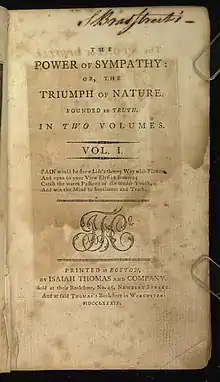William Hill Brown
William Hill Brown (November 1765 – September 2, 1793) was an American novelist, the author of what is usually considered the first American novel, The Power of Sympathy (1789),[1] and "Harriot, or the Domestic Reconciliation",[2] as well as the serial essay "The Reformer", published in Isaiah Thomas' Massachusetts Magazine.

Life
Brown was born in Boston, Massachusetts, the son of Gawen Brown and his third wife, Elizabeth Hill Adams. Gawen Brown was from Northumberland, England and was a clockmaker.[3] William was christened at the Hollis Street Church on December 1, 1765.
In 1789, William Brown published the novel The Power of Sympathy. Brown had an extensive knowledge of European literature, for example of Clarissa by Samuel Richardson,[4] but tries to lift the American literature from the British corpus by choice of an American setting. The book drew close comparison to a local scandal and was subsequently withdrawn from sale.[5] He contributed a number of essays to the Columbian Centinel.
Around October 1792, Brown himself withdrew to join his sister, Eliza Brown Hinchborne, at the Hinchborne plantation near Murfreesboro, North Carolina, and began to read law with William Richardson Davie at Halifax. Eliza died in January 1793. Not yet acclimated to the Eastern North Carolina climate, William Brown died of fever, probably malaria, the following August, at the age of twenty-seven.[6]
Works
Brown held the conviction that novels should aim at some high moral purpose.[4]
References
- Brown, William Hill. The Power of Sympathy, (William S. Kable, ed.), Ohio State University Press, 1969, Intro, p. xiv
- Originally published in January 1789 in The Massachusetts Magazine. Carla Mulford (ed.) (2002): Early American Writing. Oxford University Press. New York. p. 1084ff.
- Ellis, Milton. "Brown, William Hill", DAB, Supplement One, pp. 125-26
- Arner, Robert D. "Sentiment and Sensibility: The Role of Emotion and William Hill Brown's The Power of Sympathy." Studies in American Fiction, vol. 1 no. 2, 1973, p. 121-132. Project MUSE doi:10.1353/saf.1973.0002
- Parramore, Thomas C., "Brown, William Hill", Dictionary of North Carolina Biography, (William S. Powell, ed.) 1979. University of North Carolina Press
- Byers, John R. "A Letter of William Hill Brown's", American Literature, vol. 49, no. 4, 1978, pp. 606–611
- Brown, William Hill. Selected Poems and Verse Fables 1784-1793
- Kable, p.xxii.
External links
- Works by William Hill Brown at LibriVox (public domain audiobooks)

- Biography of Brown